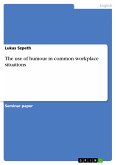Seminar paper from the year 2018 in the subject English Language and Literature Studies - Linguistics, grade: 1,3, Free University of Berlin, language: English, abstract: The following paper aims at finding and examining such communicative functions of irony. It is organised as follows: after providing some specific conditions which are indispensable for a detectability of irony, two different types of irony are presented which differ not only in their relation to the particular context, but also in the strategies that are used to achieve the ironic effect. In the last section, the communicative functions of both types of irony are discussed in more detail. As a result it is shown that the different strategies have a certain impact on the communicative functions of the respective type. The communicative functions of verbal irony differ significantly from those made in literal language. In contrast to saying what is meant directly, ironic statements generally provide two narratives, always leaving the ironist's "victim" the choice to which to refer. Thus, the evaluative attitude, which is inherent to every ironic utterance, is to be conveyed in a mitigated manner. Such a mitigation of an evaluation is important in social environments where the aspect of saving one's face is of great interest. Whereas criticising or praising literally can negatively affect the speaker's or the hearer's social status, the ironic counterparts predominantly have a positive impact on the relationship between ironist and recipient. In this regard, irony must be considered a highly sociable way of communicating.
Dieser Download kann aus rechtlichen Gründen nur mit Rechnungsadresse in A, B, BG, CY, CZ, D, DK, EW, E, FIN, F, GR, HR, H, IRL, I, LT, L, LR, M, NL, PL, P, R, S, SLO, SK ausgeliefert werden.









